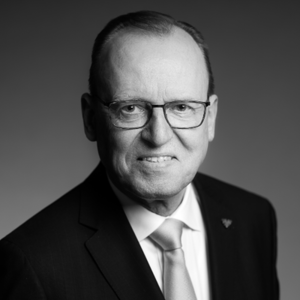Flemming Besenbacher
(academic) | |
|---|---|
 | |
| Born | 4 October 1952 |
| Nationality | Danish |
| Alma mater | Aarhus university |
| Interests | • nanotechnology • self-assembling nanobots |
Danish researcher on self-organizing nanotructures and biocompatible materials who attended the 2014 Bilderberg in Copenhagen. Carlsberg Foundation. | |
Flemming Besenbacher is a Danish physicist and professor of nanotechnology at the Department of Physics and Astronomy, Aarhus University. He is also the founder of iNano (Interdisciplinary Nanoscience Center) which is part of the Faculty of Science and Technology at Aarhus University. The center was founded in 2002 and conducts teaching and research in nanoscience[1]. etween 2007 and 2010, Besenbacher became an honorary professor at eight different lists of universities in China. He is also chairman of the board of the Carlsberg Foundation.
Besenbachers researches the development and use of scanning tunnel microscopes and other surface-sensitive tools to study, among other things, self-organizing nanotructures, biocompatible materials and the synthesis and characterization of nanostructures on surfaces.[2]
He has won many awards for his research, including Villum Kann Rasmussen's award, which is the largest research award in Denmark[3]. By March 2011, he had 480 scientific articles published, ten in Science and ten in Nature. His articles have been cited over 14,000 times. In 2006, he was named the third most influential person in Danish research. [4]
Flemming Besenbacher received a special pension system when he took office, where he received four million Danish kroner in pension upon joining rather than having to earn the pension himself.
Contents
Education
Besenbacher graduated in physics from Aarhus University in 1978. Besenbacher became a professor at Aarhus University in 1996 and the following year a visiting professor over the summer at Berkeley Lab, University of California, Berkeley.
Conflict of interest
In June 2020, the Danish Agency for Education and Research received an inquiry regarding irregularities in the Danish Innovation Fund during urgent processing of Covid-19-related applications. Doubts were raised as to whether there was conflicts of interest for Besenbacher, who at the time was the fund's deputy chairman, and whether rules on peer review and interview with the applicant had been deviated from as a result of the extraordinary express treatment justified by Covid. Berlingske Tidende further described how two officials in the foundation who had spoken out against the rules being deviated from had subsequently been dismissed. [5][6] Behind a supported project was, among others, a member of the Society of Sciences, who is responsible for appointing the board the Carlsberg Foundation, of which Besenbacher is also chairman. Doubts were also raised as to whether Besenbacher was incompetent in distributing funds to Aarhus Vand A/S, where he himself is chairman of the board, and to the iNANO center at Aarhus University, where he himself is associated as a professor.
The case of the Carlsberg Foundation and Aarhus University
Professor Flemming Besenbacher became a central figure in the case of a large, Danish study[7], which back in 2016 made headlines with its conclusion that humans were better than supercomputers at solving certain quantum physical problems. The Carlsberg Foundation awarded the study DKK 15 million in 2018 [8] despite the fact that the Belgian researcher Dries Sels at Harvard University in the summer of 2017 had pointed out serious irregularities in the work.[9] Besenbacher was very negative in private emails, among others to the rector of Aarhus University, towards criticism of the article from researchers at the university, where he called the critical researchers "pooping in their own nest" and "baboons", who deserved "a plop in the head".[10]
The criticism proved to be correct,[11] and the article was consequently withdrawn from the journal Nature in 2020.[12] As a consequence of the case, Flemming Besenbacher regretted his statements, announcing that he would no longer process applications for research funding from Aarhus University.[13]
Events Participated in
| Event | Start | End | Location(s) | Description |
|---|---|---|---|---|
| Bilderberg/2014 | 29 May 2014 | 1 June 2014 | Denmark Copenhagen Marriott Hotel | The 62nd Bilderberg, with 136 guests, held in Copenhagen |
| WEF/Annual Meeting/2013 | 23 January 2013 | 27 January 2013 | World Economic Forum Switzerland | 2500 mostly unelected leaders met to discuss "leading through adversity" |
| WEF/Annual Meeting/2014 | 22 January 2014 | 25 January 2014 | World Economic Forum Switzerland | 2604 guests in Davos considered "Reshaping The World" |
| WEF/Annual Meeting/2016 | 20 January 2016 | 23 January 2016 | World Economic Forum Switzerland | Attended by over 2500 people, both leaders and followers, who were explained how the Fourth Industrial Revolution would changed everything, including being a "revolution of values". |
| WEF/Annual Meeting/2017 | 17 January 2017 | 20 January 2017 | World Economic Forum Switzerland | 2950 known participants, including prominently Bill Gates. "Offers a platform for the most effective and engaged leaders to achieve common goals for greater societal leadership." |
| WEF/Annual Meeting/2019 | 22 January 2019 | 25 January 2019 | World Economic Forum Switzerland | "The reality is that we are in a Cold War [against China] that threatens to turn into a hot one." |
| WEF/Annual Meeting/2020 | 21 January 2020 | 24 January 2020 | World Economic Forum Switzerland | This mega-summit of the world's ruling class and their political and media appendages happens every year, but 2020 was special, as the continuous corporate media coverage of COVID-19 started more or less from one day to the next on 20/21 January 2020, coinciding with the start of the meeting. |
References
- ↑ https://www.nordnet.se/mux/web/analys/nyheter/visaNyhet.html?itemid=208865013&sourcecode=ddk
- ↑ http://besenbacher.inano.dk/fileadmin/inano/Besenbacher-bruger/publications/Biosketch__Flemming_Besenbacher__November_2009.pdf
- ↑ http://www.nanotech.dtu.dk/English/News/Arkiv.aspx?guid={5A9F4BEA-6990-4328-8C7D-C47AF2D722B9}
- ↑ https://web.archive.org/web/20171116143031/http://www.au.dk/nyheder/glnyheder/2006/150506/
- ↑ https://www.berlingske.dk/samfund/to-embedsmaend-i-offentlig-milliardfond-advarede-om-muligt-lovbrud-tre
- ↑ https://www.berlingske.dk/ledere/besenbachers-lette-forhold-til-jura-og-moral
- ↑ https://www.nature.com/articles/nature17620
- ↑ https://www.carlsbergfondet.dk/en/News/News-from-the-Foundation/News/Beyond-Citizen-Science
- ↑ https://doi.org/10.1103%2FPhysRevA.97.040302
- ↑ https://www.berlingske.dk/samfund/carlsberg-formand-skal-staa-skoleret-kaldte-kritiske-forskere-redeskidere
- ↑ https://arxiv.org/abs/2003.05808
- ↑ https://videnskab.dk/naturvidenskab/stort-dansk-studie-trukket-tilbage-havde-overset-fatal-fejl
- ↑ https://www.berlingske.dk/samfund/magtfuld-carlsberg-formand-kaldte-forskere-redeskidere-nu-faar-det